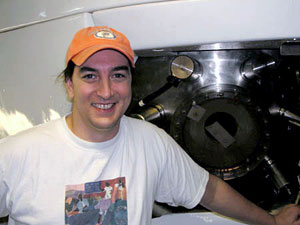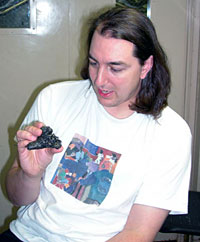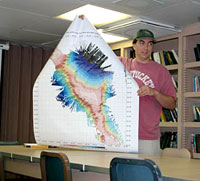Interviews: Chief
Scientist Jess Adkins
 Jess
Adkins, a geochemistry professor at the California Institute of
Technology, is chief scientist on Expedition 7. A chemical oceanographer
who minored in political philosophy in college, a smart and serious
man with a great sense of humor and fun, young (35) but with a lot
of responsibility, Jess is many things. We sat down recently to
talk about some of them. Jess
Adkins, a geochemistry professor at the California Institute of
Technology, is chief scientist on Expedition 7. A chemical oceanographer
who minored in political philosophy in college, a smart and serious
man with a great sense of humor and fun, young (35) but with a lot
of responsibility, Jess is many things. We sat down recently to
talk about some of them.
�
QUESTION: So,
your first time being Chief Scientist. How’s it been?
ANSWER: It’s
been really good. It’s a lot of work! It’s
definitely not going the way I thought it would. I was
hoping I’d be basically the chief cheerleader. You
know, we’d built up this whole structure for the
cruise — with jobs assigned, dives scheduled, other
work as set up as it could be — so I could just be
the guy saying, “You’re doing a great job,” and
making sure people were tuned into what they needed to
do.
But I haven’t had a chance to do much of that, because on this trip it’s
just been contingency after contingency, so much re-planning. So many things
have come up that we hadn’t anticipated: weather problems, etc. I knew
in the abstract it would be my role to handle those things, but the reality
has been a challenge.
QUESTION: Has
it all been harder than you thought?
ANSWER: It
hasn’t been that hard. I’ve worried more about
other people than myself: Are spirits up? Are people psyched
about their work? Are people sick or well? Other people
with more experience say, “Man, this has been the
trip of having to make new plans.” But for me, this
is just how it is, it’s all I know.
Also, it’s easy here on the cruise because everyone’s focused on
the same goal. You hear about cruises where there are a lot of competing interests.
We’ve had none of that, and we’ve still been able to achieve secondary
goals like collecting a lot of living samples and mapping the bottom. I have
to admit though, I’m very tired. I look forward to getting home and catching
up on some sleep.
QUESTION: You’ve
had a pretty varied academic background. Can you talk about that?
ANSWER: Well, I
went to college because it was the thing to do. I wanted to take
a year off after high school, but my parents discouraged it.
I’d always liked math and science, and I thought I could
be a mathematician because I was so inspired by a math teacher
in high school.
But I was interested in a lot of things, so a liberal arts experience
was perfect for me. I got to try out a lot of stuff – especially history and political
philosophy. But I did love the chemistry lab. It was fun mixing and measuring,
playing with big machines. And Haverford’s chemistry teaching was great.
Getting out of college, I knew I wanted to combine my interest
in chemistry with my love of the outdoors, which I’d formed mostly through summers
in the Adirondack Mountains in New York. And in my senior year, I got a letter
from a professor at the University of California at Santa Barbara who was looking
for lab assistants. He wrote, “If you love mountains and the ocean, this
is the place to be.” And UCSB had a national championship Ultimate Frisbee
team; that was very attractive too.
So, there was no plan. That was just a break, and you go with what presents
itself. I worked hard, and got some other good breaks, and things went on from
there. In graduate school, I got really interested in research, and in deep-sea
corals in particular. That was when I fell in love with this work.
 |
 |
QUESTION: What
in particular do you love about oceanography?
ANSWER: The
cool thing about oceanography is you have to know it all:
physics, chemistry, biology, geology, and how they all
fit together. You have to look at the big picture, and
I like that. In many ways, I feel like I know less every
day, because you keep seeing how much more there is to
understand. Some things do gel, of course. But for anyone
who’s interested, don’t limit yourself too
soon.
QUESTION: You’re
about to complete this exciting cruise. What’s next?
ANSWER: Well, I’m
getting married in a month; that’s next! But in terms of
science, the big thing is to move all of what we’ve learned
out here to the lab phase, especially dating these corals. A
bit further down the road, I need to learn more about biology.
I’m interested in how the corals make their skeletons.
Finding time is the hardest part. I know what I need to figure
out, unlike back in college where you’re just assimilating a lot of different things.
I even know the book I need to read for the biology. But it’s finding
the time that’s hard.
So I have a book to read, but then there are other big plans.
This fall I’ll
be going to Borneo, to look at stalagmites in caves. We’re installing
a fancy new machine in my lab to do uranium-series dating. And there will be
other cruises!
QUESTION: Do
the time challenges extend to your non-science life?
ANSWER: Definitely!
One thing that makes you question this work is how it reduces
the number of other things you can do. I still love soccer, Ultimate,
climbing and hiking, photography. The things that have stuck
are hiking, and some recreational team sports, and time with
Tami (my fiancée). It’s a struggle to balance, just
like everyone says. But I’m very lucky to have all those
things to balance.
Back
to main interviews page
[Back
to top]
| 


